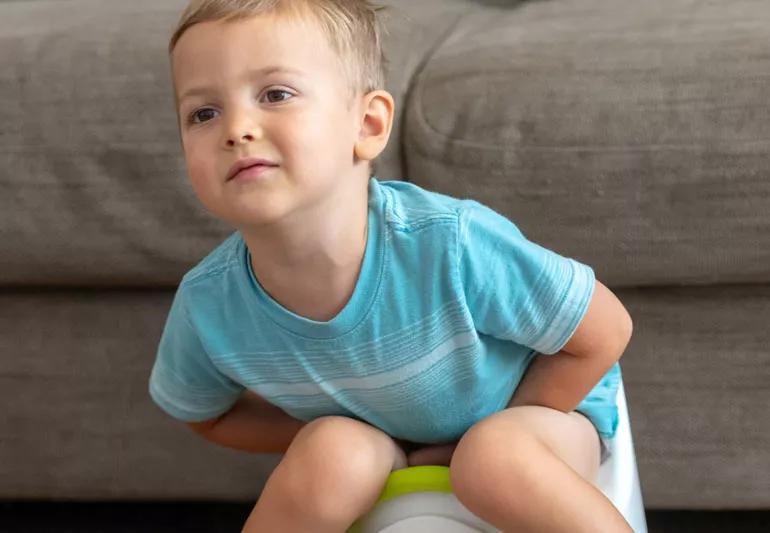When your toddler won’t poop, here’s what you can do

Image content: This image is available to view online.
View image online (https://assets.clevelandclinic.org/transform/436a523a-366c-4011-9714-85b9e0f91e80/toddlerPoopPotty-1037037128-770x533-1_jpg)
toddler on potty
For a parent of a toddler, the graduation from diapers to underwear is a milestone to be celebrated. Seriously. It can feel like it’s up there with their actual graduation.
Advertisement
Cleveland Clinic is a non-profit academic medical center. Advertising on our site helps support our mission. We do not endorse non-Cleveland Clinic products or services. Policy
So, when your toddler refuses to poop on the potty, it can feel as if the wheels of their development have ground to a halt.
Taking some time to master pooping on the potty can be completely normal, though, says pediatric gastroenterologist Deborah Goldman, MD.
“Stool withholding, in which a child avoids having bowel movements, is a fairly common issue that we encounter,” she says. “Kids eventually get toilet trained, but it’s important for parents to address this problem right away because it can lead to other issues down the line.”
Fortunately, Dr. Goldman is here to share some tricks you can turn to when your child is holding in their poop.
Stool withholding behavior is more common in boys, but any child may start withholding poop at any time during the potty training process, Dr. Goldman says.
“The most common reason is that they passed a very hard or large stool that was painful for the child,” she says. Reasons for their discomfort come from things like a change in diet, constipation or something else.
“One painful bowel movement may be all it takes to cause children to associate pain with passing stool, so they start withholding it instead,” Dr. Goldman explains.
Other reasons children might withhold stool include:
Advertisement
Stool withholding that lingers can start a domino-style reaction that can seriously derail potty training and make your child (and you) pretty miserable, so it’s best to nip stool withholding in the bud.
When your child doesn’t poop for a while, their stool collects in their colon and hardens. With this backup, if your child is taking a stool softer, then liquid stool can leak around it and stain their underwear. That can leave your child feeling defeated and can fuel your own frustrations.
According to Dr. Goldman, kids who are withholding their stool can also have bedwetting issues, urine leakage or even urinary tract infections if the problem continues for long enough.
So, let’s get to the bottom (pun intended) of getting your kid pooping on the potty.
The American Academy of Pediatrics recommends a “child-oriented” method of potty training. It states:
“You can’t force a toddler to use the toilet just because you want to start potty training,” Dr. Goldman says. “Make sure they’re ready before you begin potty training. If you start too early, they may develop a fear of the potty.”
Now that you know when to start, what else can you do to get your little one pooping like a pro?
Making your child comfortable in the bathroom is important for potty-training success and encouraging the all-important poop. You’ll want to make sure:
If your child is holding their poop because they’re anxious about using the toilet, talk about what they’re worried about, and address those concerns with them. You know your child isn’t about to fall into the toilet or that a snake isn’t going to come out of the pipe and bite their little bum, but those may seem like realistic scenarios to a toddler.
Don’t dismiss their concerns, however silly they may seem. Empathize, let them know you hear them and make it clear that you’ll make sure they’re safe when they’re on the potty.
Advertisement
Positive reinforcement is a powerful tool. Use it! When your child successfully uses the potty — for No. 1 or No. 2 — follow up with celebrations and rewards. Cheer together as your little one flushes the toilet. Use a sticker chart to show off their successes. Encourage them to tell other family members about their accomplishments to build some pride in their hard work.
Some good old-fashioned bribery can work, too. After a set number of successful potties, maybe they earn a trip to the park or a special treat from the store. Whatever it is that motivates your child, use it to encourage their success.
If you suspect your child is having painful poops, it may help to make changes to their diet or use fiber supplements or stool softeners. Dr. Goldman emphasizes that you should check with your doctor for specific advice before giving your child such supplements or over-the-counter stool softening medications.
Dr. Goldman says it’s time to see your doctor if:
Advertisement
When your child won’t poop in the potty, it can feel like you’ll be lugging around that diaper bag forever. Take heart that, just as they’ve learned to talk and walk, they’ll soon enough learn to toilet, too. (Cue the happy tears!)
Advertisement

Delivered every Tuesday!
Sign up for our Health Essentials emails for expert guidance on nutrition, fitness, sleep, skin care and more
It's a letter about the news!
Learn more about our editorial process.
Advertisement
Get to the source, offer encouragement and keep your cool
Praise and nonfood prizes go a long way
And everything else you need to know to successfully potty train
Teething and frustration can make the ‘terrible 2s’ an unfortunate reality
Maturity and safety matter more than age
Toddler tantrums are normal, but sometimes, they need your help
Three tips for encouraging a healthy weight
How to help (and not shame) your child — while keeping your sanity
Type 2 diabetes isn’t inevitable with these dietary changes
Applying a hot or cold compress can help with pain
Pump up your iron intake with foods like tuna, tofu and turkey